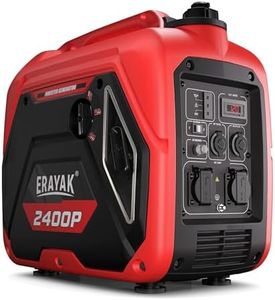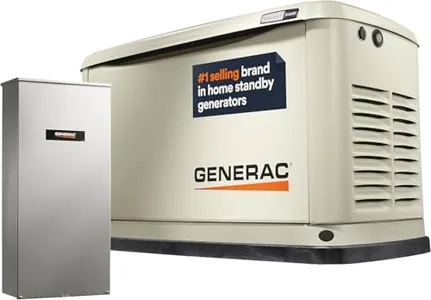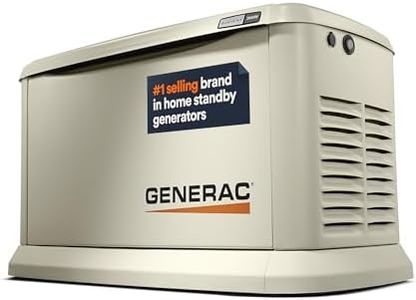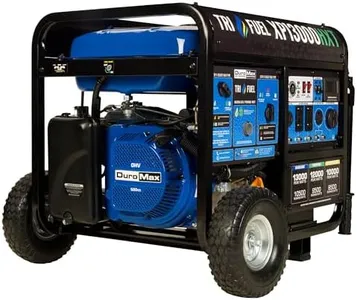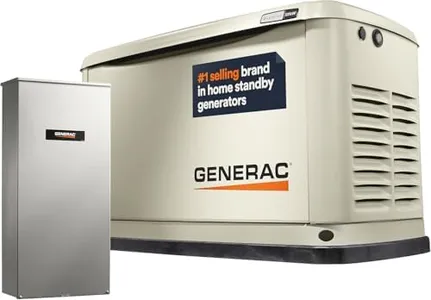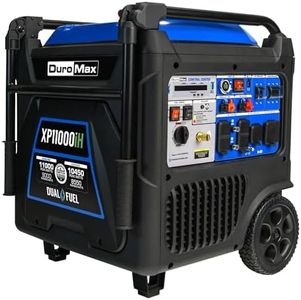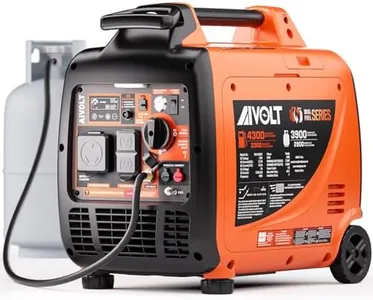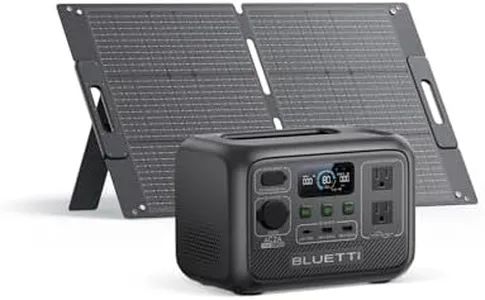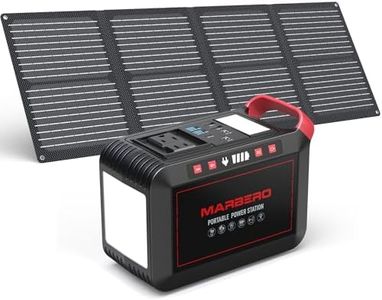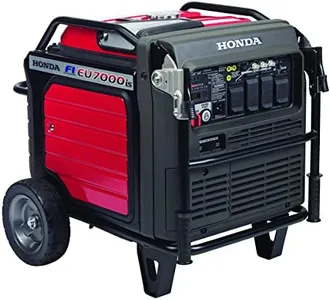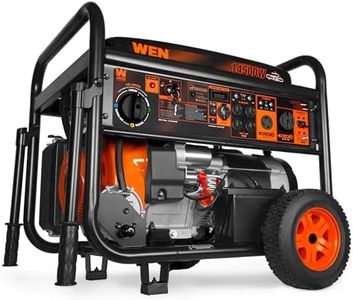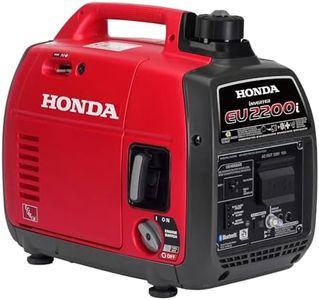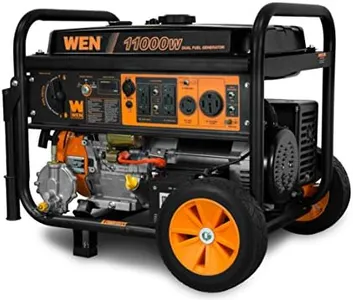Top 10 Generators Deals Right Now
Generac Guardian 24kW Home Standby Generator with 200 Amp Transfer Switch - Automatic Whole House Backup Power for Storms, Emergencies, and Outages, WiFi Enabled, Runs on Natural Gas or Liquid Propane
Our technology thoroughly searches through the online shopping world, reviewing hundreds of sites. We then process and analyze this information, updating in real-time to bring you the latest top-rated products. This way, you always get the best and most current options available.

Our Top Picks
Generac Guardian 24kW Home Standby Generator with 200 Amp Transfer Switch - Automatic Whole House Backup Power for Storms, Emergencies, and Outages, WiFi Enabled, Runs on Natural Gas or Liquid Propane
Most important from
65 reviews
The Generac 7210 24kW Air Cooled Guardian Series Home Standby Generator is a robust choice for homeowners looking for dependable power during outages. One of its standout features is the impressive 24,000 watts of power output, which is more than sufficient to keep essential appliances running smoothly. The generator is designed to operate on natural gas or LP gas, making it flexible regarding fuel options. Its 200-amp transfer switch ensures that your entire home can be powered, providing peace of mind during unexpected blackouts.
Portability may not be a strong suit, as this generator weighs 455 pounds, making it more suitable for stationary installation rather than frequent relocation. On the positive side, the unit is engineered for easy installation by a licensed electrician, so you won't have to worry about the technicalities of setup.
A significant advantage is the Wi-Fi connectivity through Mobile Link, enabling remote monitoring. This allows you to check the generator's performance from anywhere and receive alerts about maintenance, which is especially useful for busy homeowners. While the generator is built to last and backed by a 5-year limited warranty, some users may find the initial investment to be significant. However, the quality of the G-Force engine and the advanced True Power Technology, which ensures clean energy with minimal distortion, justify the cost for many.
Most important from
65 reviews
Great Choice
Generac Guardian 26kW Home Standby Generator - Automatic Whole House Backup Power for Storms, Emergencies, and Outages, WiFi Enabled, Runs on Natural Gas or Liquid Propane, Quiet Operation
Most important from
11 reviews
The Generac Guardian 26kW Home Standby Generator is a solid choice for homeowners needing reliable backup power during outages, storms, or emergencies. It offers a powerful 26,000-watt output, enough to support an entire home, which means you can keep most or all of your essential appliances running simultaneously. This model runs on natural gas or liquid propane, giving flexibility depending on your available fuel sources. It features Generac's G-Force 1000 Series engine known for durability and efficient fuel use, which helps keep operational costs lower over time.
This generator is designed for stationary home installation and weighs 518 pounds, so it's not portable but meant as a permanent backup solution. Noise levels are kept relatively low with a 'Super Quiet' feature and a Quiet-Test mode that reduces engine speed during self-tests, making it less disruptive to your household and neighbors. Four power outlets provide ample connectivity options for your home's needs. One standout feature is the built-in Wi-Fi monitoring that lets you track the unit's status and maintenance alerts remotely, adding convenience and peace of mind.
Installation requires a certified electrician, which may add to upfront costs but ensures the unit operates safely and efficiently. The size and weight make it unsuitable if you need a portable generator or have space constraints. Also, because it’s designed for whole-house use, it may be more generator than some users need if they only require backup for a few essential devices. The 5-year warranty provides added reassurance typical for this level of investment. This generator is well-suited for homeowners looking for reliable, quiet, and relatively low-maintenance whole-house backup power but less suited for those needing portability or a lightweight option.
Most important from
11 reviews
DuroMax XP13000HXT 13,000-Watt 500cc Tri Fuel Gas Propane Natural Gas Portable Generator with CO Alert, Black/Blue
Most important from
2389 reviews
The DuroMax XP13000HXT is a powerful portable generator offering up to 13,000 starting watts and 10,500 running watts, making it suitable for whole-home backup during power outages or for commercial use. One of its standout features is the tri-fuel capability, meaning it can run on gasoline, propane, or natural gas. This flexibility lets you choose the most convenient or cost-effective fuel available. It has a robust 500cc engine designed to deliver reliable power and includes a push-button and remote start system for easy operation, which is handy if you need to start it from a distance.
In terms of run time, it provides about 8 hours of continuous use, which is decent for extended power needs but depends on the fuel type and load. Portability is supported by a wheel and handle kit, though at 240 pounds, it's quite heavy and might require some effort to move around. Noise level is around 74 decibels, which is moderate and typical for generators of this size—noticeable but not overly loud.
Connectivity options are plentiful with seven outlets, including a 50 amp transfer switch-ready outlet for easy integration with home wiring systems. It also features a digital display for monitoring performance, adding convenience. Safety is addressed with a CO Alert system to detect dangerous carbon monoxide levels. The size and weight could be challenging if you need something more easily portable, and while the 8-hour runtime is good, longer runtimes might require refueling during extended outages. The noise level is average and could be a consideration if you need a quieter solution. This generator suits users who require high power output, fuel flexibility, and convenient starting options in a fairly portable package.
